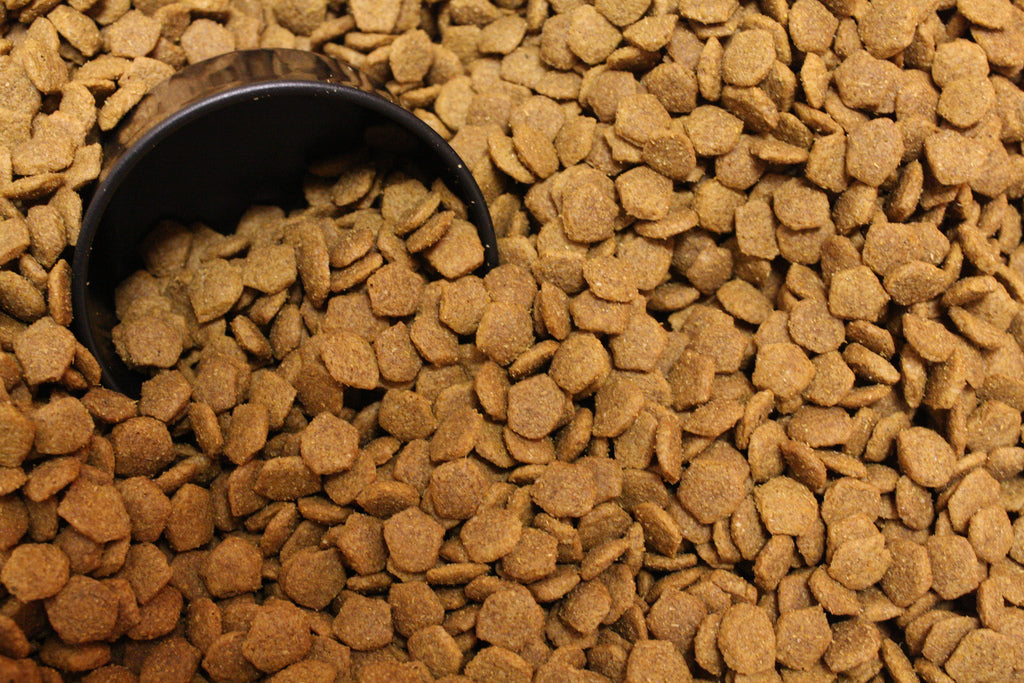Highly processed pet food may appear to be complete and balanced when reading the nutrition panel on the package, but is it really providing the best nutrition for your pet?
Studies in recent years have shown an increase in heart disease in dogs, specifically dilated cardiomyopathy in large breed dogs.
In one study, 12 dogs with dilated cardiomyopathy were being fed a commercial dry diet containing lamb meal, rice, or both as primary ingredients. Plasma taurine concentration was found to be low in all dogs. Cardiac function improved with treatment and taurine supplementation. Seven of the 12 dogs that were still alive at the time of the study were receiving no cardiac medications except taurine. Researchers concluded that consumption of certain commercial diets was associated with low blood taurine concentrations, resulting in dilated cardiomyopathy in dogs. Taurine supplementation resulted in prolonged survival times in these dogs, which is not typical for dogs with DCM. It is recommended that all dogs with DCM have blood tested for taurine concentrations and taurine supplementation is recommended while results of these analyses are pending.
The amino acid, taurine, is found in high concentrations in muscle meat. It is absent in cereal grains. Lamb, venison, and rabbit are fairly low in taurine when compared to beef, turkey, and chicken. Taurine is also found in high content in heart and tongue (both are muscles). Dark meat chicken contains ten times the amount of taurine found in white meat chicken. Fish is very high in taurine, however losses of taurine in processed fish products, ranged up to 100% when compared with the taurine content of freshly caught specimens. Fish products soaked in brines or products subjected to rough processing conditions such as mincing and washing had greater loss compared with products with more intact muscle.
Cooking decreases the amount of taurine available, particularly if a water-based cooking method is used (rendering cooks the meats into a huge liquid soup, which is then dehydrated). Most of the taurine contained in tissues will be dissolved into water if exposed. Therefore, how a diet is prepared will affect the taurine that is retained in the food ingredient for consumption by the animal. Bacteria destroy taurine, so the longer the animal protein used in the food has been dead, the lower the taurine content. Again, this may be particularly important when rendered products are used to make pet food.
Feeding dry kibble diets is convenient, but most kibble diets have a low meat concentration; the majority of the ingredients come from plant sources. Pet food manufacturers discovered years ago that cats, as obligate carnivores, require high levels of taurine in their diets. Based on this knowledge, cat food has had taurine added as a synthetic supplement for decades. Unfortunately, the same research was not applied to canine diets. Once studies surfaced showing some correlation between dilated cardiomyopathy and commercial dry diets, some companies began adding synthetic taurine, but not all.
As a matter of fact, most of the biggest sellers (not the best foods, just the best selling foods) do not contain much meat or any added taurine, including: Beneful, Purina Dog Chow, Ol Roy, Kibbles N Bits, Alpo, Purina Beyond, Rachel Ray Nutrish, Taste of the Wild, Purina Pro-Plan, Purina One, and many others. When reading the ingredient panel, taurine will be listed in the ingredient list if it has been added. Remember, when you see it listed, it is a synthetic version that has been added.
Feeding fresh, whole, species-appropriate food is the best source of taurine for your pets. That means muscle meat and heart, tongue, spleen - organs that are also muscles. Don't assume pet food is "complete and balanced", providing all the nutrients in the essential amounts for optimum health. Even though the ingredients may have started out with important nutrients being available, the processes of rendering, extrusion, and high heat cooking may significantly diminish the availability of those nutrients.

